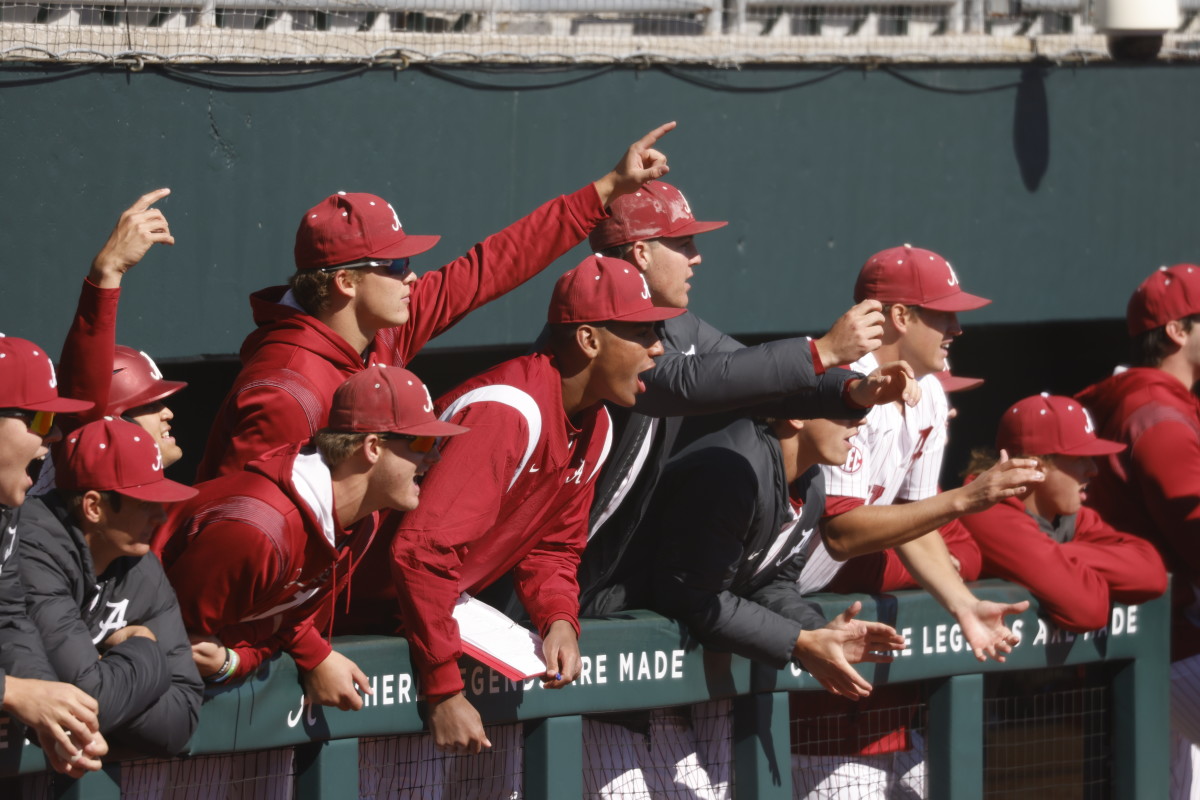Mudita: Alabama Baseball Players Find Joy in their Teammates' Successes
Throughout the journey of life, individuals in today's society are often bogged down with the weight of having to live up to high expectations — or at least perceived high expectations — from those around us.
Struggling to outperform our fellow man or woman, pressure from peers and the ongoing stresses of trying to one-up and best those around us can be quite a challenge. Whether it be at home or at work, for many people the swirling whirlpool of living up to others' expectations can ultimately lead to being caught up in the maelstrom of societal pressure, causing oneself to slip or stumble.
The advent of social media over the last couple of decades has done nothing but increase the pressure that people feel on a daily basis. Should one succeed, they are quick to boast about their personal gains. Should one fail, the ever-looming fear of criticism from others rears its ugly head.
For Alabama baseball, changing that mentality has been a strong emphasis this season. While in years past, individuals on the team focused on personal gain and individual stats, this year is something very different. Rather than each player focus on his own personal successes, this year's approach by the individuals is something else entirely.
This year, the Crimson Tide is focused on one thing and one thing only: mudita.

So what is mudita? This writer certainly had never heard of the term, but he had heard of the sentiment it represents.
Allow redshirt-senior pitcher Brock Guffey to elaborate:
"Mudita basically just means taking joy in other people’s success,” Guffey said. “And so that’s kinda been a big thing for us this year is being just as excited for the next guy. Like, maybe if you’re not in the role that you’d want to be positionally, be the best teammate that you can be and just pulling the same rope. Basically that’s kind of been where most of the energy in the dugout it coming. Really just pulling for the next guy and making sure that you’re holding your end of the bargain up.
"Whenever you get that chance late in the game and you don’t expect it, the same guy that you’ve been cheering hard for is going to be cheering just as hard for you, so I think that’s where a lot of this energy that you’re seeing is coming from.”
Mudita is a Buddhist word meaning unselfish joy and finding that joy in the success or well-being of others. It's a practice that quite a few people in today's society could benefit from, not just the members of a college baseball team in Tuscaloosa, Ala.
Heading into this season, the Crimson Tide saw multiple players leave for the MLB as well as the arrival of several impact transfers and freshmen. While the team had experienced success last season after reaching its first NCAA Regional since 2014, the team clearly had more growing to do if it wanted to make it further.
In short, it needed a new approach to the game. While players in the past had been focused on individual gains and individual successes, this season the team was going to focus on the group as a whole rather than how each individuals were performing.
The result? A dugout energy that made each player feel like a contributor, regardless of how well or how poorly they had performed in an individual at-bat or outing on the mound.
"[Mudita] is pretty much exactly what we’ve been trying to accomplish throughout our whole team is making sure that no one is worried about individual stats,” junior shortstop Jim Jarvis said. “It’s all about what the whole team is doing. We’ve been talking about getting rid of individual stats. Like, even if you went 4-for-4, you didn’t go 4-for-4. Like, the team went 12-for-27 or whatever it is. You think about team stats over personal stats. Like, when your teammate gets a hit, it’s like ‘We got a hit,’ if that makes sense.”
So what exactly triggered this newfound mindset of the program? Well, multiple players gave different answers, but all fit together to form a narrative that expresses that mudita had been building in the program for quite some time.

After a solid 16-1 start to the season in 2020, the year was cut short due to the COVID-19 pandemic. Alabama was poised to succeed with one of its best starts to a season in quite some time. However, the pandemic had other plans for the program, causing it to prematurely hang up its gloves and stow away its bats despite a promising start.
In fall ball later that same year, the team regrouped to prepare for the 2021 season, but things were different. COVID restrictions forced different groups to work out at assigned times rather than as a whole team, and many players were forced to focus on bettering themselves individually at home rather than as a collective unit with their teammates.
One would think that with so much time spent isolated, the focus would shift to individualism rather than a collective effort. In short, it did at first. However, following the end of the 2021 season, the players' perspectives had changed heading into fall practices ahead of the 2022 season.
“I think it really hit us last year whenever — with COVID and everything — every pitching group was different,” Guffey said. “Every lifting group was different. Like, you never even saw half the position players. Like, I didn’t know everybody’s name until almost three-quarters’ way through the fall of COVID year and I think that was pretty frustrating.
"I think coming up towards the end of the year it really started catching up to us, so I think a lot of the older guys on the team understood this year that we were gonna have to make a change and we were gonna have to really have to make an extra effort to bring this team together and make us tighter.”
That change? Mudita.
While the team leadership knew that it was going to have to find a new focus for 2022, it couldn't quite figure out exactly what kind of new approach it would need to take. In 2021, the program's players had predominantly been focused on their own selves rather than the collective successes of the team, so that would be the starting point.
According to graduate transfer outfielder Tommy Seidl, it was actually Alabama softball coach Patrick Murphy that first introduced the players to the term 'mudita.' Murphy has used the term for years with his program, and its usage rubbed off on the baseball players as well.
“I think coach Murphy from the softball team is the one that introduced the idea of mudita to us,” Seidl said. “It definitely defines how we all feel about this team. We have so many guys that are going to contribute — it might not be every day but everybody is going to contribute — so we feed off of each other’s energy and each other’s success because we know when it becomes our turn, we’re going to do the exact same thing for them.”
“Mudita benefits our team because we play for something greater than ourselves when you’re playing for the team. One man’s success or failure doesn’t define our team’s success, so it’s easier to play more relaxed and compete harder when you know that you’re playing for something that’s bigger than yourself.”

Armed with the newfound approach, the term was introduced to the team, which began to see a renewed sense of dugout energy and support for the collective group. Instead of a group of individuals playing college baseball, the players had formed together into one cohesive unit that praised each other for their personal successes.
This season, the Crimson Tide has started the year 12-5 with one game against Southern Miss to go before hosting its first SEC weekend series against Florida. Obviously all players would have rather seen and undefeated 17-0 start to the season, but the shifting mindset has caused the players to be focused on the small successes rather than the entire season as a whole.
Another byproduct of the changing mindset has been a renewed focus on praising people's performances, regardless of what the scoreboard reads.
“I think the difference between this year and years past is we are no longer playing to whatever the scoreboard says,” Jarvis said. “It doesn’t matter what the inning is or what the score is between both teams, we’re playing as hard as we can no matter what."

On opening day, Alabama trailed 4-1 to Xavier heading into the bottom of the ninth inning. A solo home run by catcher Dominic Tamez, and RBI double by right fielder William Hamiter and a two-run, walk-off home run by designated hitter Owen Diodati gave the Crimson Tide it needed for a come-from-behind win.
According to Jarvis, that win signified perfectly the changes that mudita has given the team.
"On opening day, we were down three going into the last inning and we weren’t hitting the entire game and every single inning we came in the dugout was just like on fire," Jarvis said. "Like, electric. Like, expecting this inning to be the one that we’re gonna score in. So there’s never a down inning. It’s like ‘We’re gonna get them right here, and if it doesn’t work out then we’re gonna get them right here.’ It never stops, which is the biggest difference between this year and last year.
"I think in years past, if we didn’t score in the first six innings, it was like ‘Damn, what’s going on’ — you kinda start to panic a little bit — but this year, it’s like even if we lose a game, we’re still like ‘Hey, tomorrow we got ‘em,’ which is huge I think.”
Alabama still has a long way to go this season, but the effects of mudita have already presented themselves and seem to be paying its dividends. Despite pressure in years past from teammates as well as the opposition, the Crimson Tide is boldly pressing forward to put those days behind it.
With SEC play on the horizon and a renewed sense of focus and clarity, Alabama baseball is poised to benefit greatly from its newfound perspective.
“I think we bring a new sort of swagger this year where we don’t have to worry about outcomes because we know how good we are, how good we can be," Jarvis said. "So it’s just a matter of playing to our potential opposed to playing to win the game."
